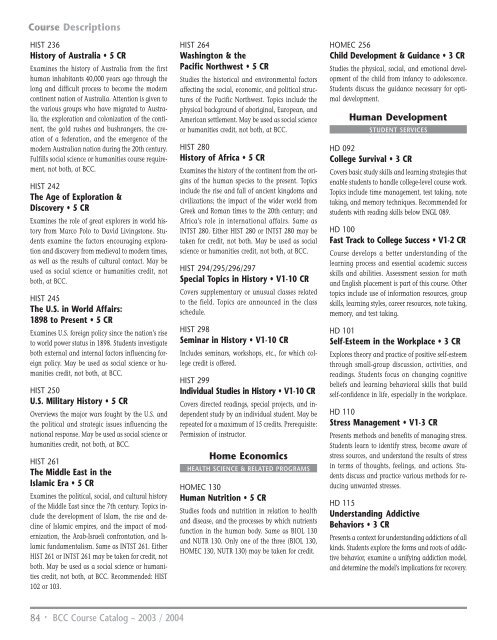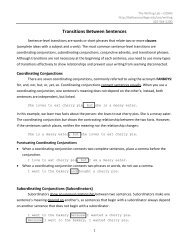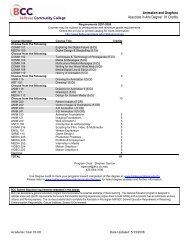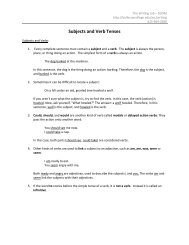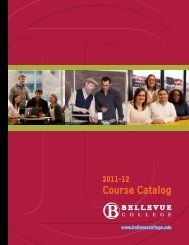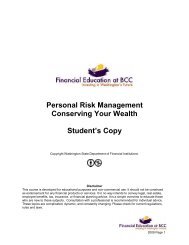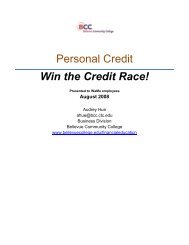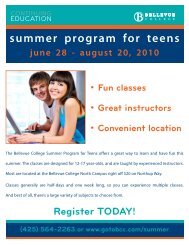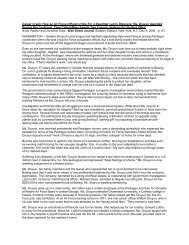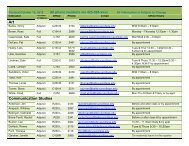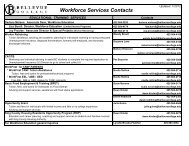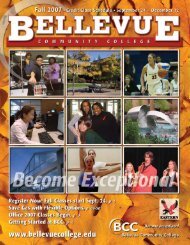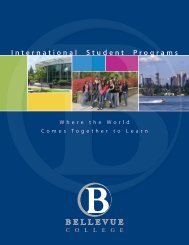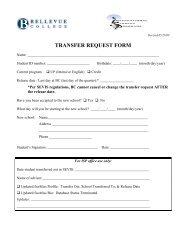2003 / 2004 - Bellevue College
2003 / 2004 - Bellevue College
2003 / 2004 - Bellevue College
You also want an ePaper? Increase the reach of your titles
YUMPU automatically turns print PDFs into web optimized ePapers that Google loves.
Course Descriptions<br />
HIST 236<br />
History of Australia • 5 CR<br />
Examines the history of Australia from the first<br />
human inhabitants 40,000 years ago through the<br />
long and difficult process to become the modern<br />
continent nation of Australia. Attention is given to<br />
the various groups who have migrated to Australia,<br />
the exploration and colonization of the continent,<br />
the gold rushes and bushrangers, the creation<br />
of a federation, and the emergence of the<br />
modern Australian nation during the 20th century.<br />
Fulfills social science or humanities course requirement,<br />
not both, at BCC.<br />
HIST 242<br />
The Age of Exploration &<br />
Discovery • 5 CR<br />
Examines the role of great explorers in world history<br />
from Marco Polo to David Livingstone. Students<br />
examine the factors encouraging exploration<br />
and discovery from medieval to modern times,<br />
as well as the results of cultural contact. May be<br />
used as social science or humanities credit, not<br />
both, at BCC.<br />
HIST 245<br />
The U.S. in World Affairs:<br />
1898 to Present • 5 CR<br />
Examines U.S. foreign policy since the nation’s rise<br />
to world power status in 1898. Students investigate<br />
both external and internal factors influencing foreign<br />
policy. May be used as social science or humanities<br />
credit, not both, at BCC.<br />
HIST 250<br />
U.S. Military History • 5 CR<br />
Overviews the major wars fought by the U.S. and<br />
the political and strategic issues influencing the<br />
national response. May be used as social science or<br />
humanities credit, not both, at BCC.<br />
HIST 261<br />
The Middle East in the<br />
Islamic Era • 5 CR<br />
Examines the political, social, and cultural history<br />
of the Middle East since the 7th century. Topics include<br />
the development of Islam, the rise and decline<br />
of Islamic empires, and the impact of modernization,<br />
the Arab-Israeli confrontation, and Islamic<br />
fundamentalism. Same as INTST 261. Either<br />
HIST 261 or INTST 261 may be taken for credit, not<br />
both. May be used as a social science or humanities<br />
credit, not both, at BCC. Recommended: HIST<br />
102 or 103.<br />
84 • BCC Course Catalog ~ <strong>2003</strong> / <strong>2004</strong><br />
HIST 264<br />
Washington & the<br />
Pacific Northwest • 5 CR<br />
Studies the historical and environmental factors<br />
affecting the social, economic, and political structures<br />
of the Pacific Northwest. Topics include the<br />
physical background of aboriginal, European, and<br />
American settlement. May be used as social science<br />
or humanities credit, not both, at BCC.<br />
HIST 280<br />
History of Africa • 5 CR<br />
Examines the history of the continent from the origins<br />
of the human species to the present. Topics<br />
include the rise and fall of ancient kingdoms and<br />
civilizations; the impact of the wider world from<br />
Greek and Roman times to the 20th century; and<br />
Africa’s role in international affairs. Same as<br />
INTST 280. Either HIST 280 or INTST 280 may be<br />
taken for credit, not both. May be used as social<br />
science or humanities credit, not both, at BCC.<br />
HIST 294/295/296/297<br />
Special Topics in History • V1-10 CR<br />
Covers supplementary or unusual classes related<br />
to the field. Topics are announced in the class<br />
schedule.<br />
HIST 298<br />
Seminar in History • V1-10 CR<br />
Includes seminars, workshops, etc., for which college<br />
credit is offered.<br />
HIST 299<br />
Individual Studies in History • V1-10 CR<br />
Covers directed readings, special projects, and independent<br />
study by an individual student. May be<br />
repeated for a maximum of 15 credits. Prerequisite:<br />
Permission of instructor.<br />
Home Economics<br />
HEALTH SCIENCE & RELATED PROGRAMS<br />
HOMEC 130<br />
Human Nutrition • 5 CR<br />
Studies foods and nutrition in relation to health<br />
and disease, and the processes by which nutrients<br />
function in the human body. Same as BIOL 130<br />
and NUTR 130. Only one of the three (BIOL 130,<br />
HOMEC 130, NUTR 130) may be taken for credit.<br />
HOMEC 256<br />
Child Development & Guidance • 3 CR<br />
Studies the physical, social, and emotional development<br />
of the child from infancy to adolescence.<br />
Students discuss the guidance necessary for optimal<br />
development.<br />
Human Development<br />
STUDENT SERVICES<br />
HD 092<br />
<strong>College</strong> Survival • 3 CR<br />
Covers basic study skills and learning strategies that<br />
enable students to handle college-level course work.<br />
Topics include time management, test taking, note<br />
taking, and memory techniques. Recommended for<br />
students with reading skills below ENGL 089.<br />
HD 100<br />
Fast Track to <strong>College</strong> Success • V1-2 CR<br />
Course develops a better understanding of the<br />
learning process and essential academic success<br />
skills and abilities. Assessment session for math<br />
and English placement is part of this course. Other<br />
topics include use of information resources, group<br />
skills, learning styles, career resources, note taking,<br />
memory, and test taking.<br />
HD 101<br />
Self-Esteem in the Workplace • 3 CR<br />
Explores theory and practice of positive self-esteem<br />
through small-group discussion, activities, and<br />
readings. Students focus on changing cognitive<br />
beliefs and learning behavioral skills that build<br />
self-confidence in life, especially in the workplace.<br />
HD 110<br />
Stress Management • V1-3 CR<br />
Presents methods and benefits of managing stress.<br />
Students learn to identify stress, become aware of<br />
stress sources, and understand the results of stress<br />
in terms of thoughts, feelings, and actions. Students<br />
discuss and practice various methods for reducing<br />
unwanted stresses.<br />
HD 115<br />
Understanding Addictive<br />
Behaviors • 3 CR<br />
Presents a context for understanding addictions of all<br />
kinds. Students explore the forms and roots of addictive<br />
behavior, examine a unifying addiction model,<br />
and determine the model’s implications for recovery.


